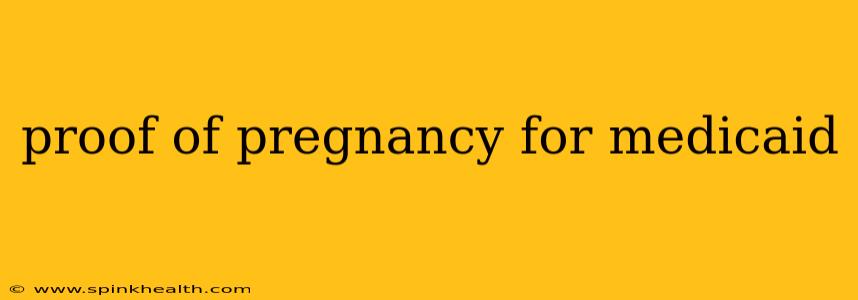Navigating the Path to Medicaid Pregnancy Coverage: Understanding Proof of Pregnancy
The journey to motherhood is filled with joy, anticipation, and, often, a fair share of logistical hurdles. Securing healthcare coverage, especially Medicaid, is a crucial step, and understanding the required proof of pregnancy can significantly ease the process. This isn't just about paperwork; it's about ensuring access to vital prenatal care, a safe delivery, and healthy beginnings for your little one.
Let's embark on this journey together, unraveling the specifics of proving your pregnancy for Medicaid eligibility. My aim is to provide you with a comprehensive guide, demystifying the process and empowering you to navigate it with confidence.
What Proof of Pregnancy Do I Need for Medicaid?
This is the most frequently asked question, and rightfully so! The exact documentation required can vary slightly depending on your state and the specific Medicaid program. However, the most common forms of proof include:
-
A positive pregnancy test: This is usually the first and most crucial piece of evidence. Keep a copy of your test results, whether it was taken at home or by a healthcare professional. The date of the test is important, as it helps determine your eligibility timeframe.
-
Medical records: Documentation from a doctor, midwife, or other licensed healthcare provider confirming your pregnancy is often required. This might include a letter, a chart note, or an ultrasound report detailing your pregnancy and estimated due date.
-
Ultrasound images: While not always mandatory, ultrasound images can provide strong visual confirmation of the pregnancy and its gestational age. These are particularly useful if other documentation is unavailable or unclear.
-
Prenatal care records: Once you begin prenatal care, these records become essential. They provide a consistent record of your pregnancy, including vital information about your health and the baby's development. These records can serve as compelling proof, often outweighing the need for other documents.
What if I Don't Have Medical Records Yet?
Many women apply for Medicaid early in their pregnancy, before they've had a chance to establish care with a healthcare provider. Don't worry; you're not alone. In many states, a positive home pregnancy test, combined with a sworn statement confirming your pregnancy, may suffice in the initial application stage. However, you will almost certainly need further medical verification once your application is approved.
How Do I Obtain Proof of Pregnancy?
-
Schedule a doctor's appointment: This is the most straightforward method. A visit to your doctor or midwife will provide you with the necessary medical records and documentation.
-
Visit a Planned Parenthood or similar healthcare clinic: These clinics offer comprehensive reproductive healthcare services, including pregnancy testing and confirmation.
-
Use a telehealth service: Several telehealth platforms provide virtual consultations with healthcare professionals, who can confirm your pregnancy and provide the required documentation.
What Happens If My Application Is Denied?
If your Medicaid application is denied, don't be discouraged. Review the denial letter carefully and understand the reasons for the denial. You may need to provide additional documentation or clarify some information. Don't hesitate to contact your state's Medicaid office to understand your options and appeal the decision. You might be able to obtain assistance in gathering the necessary paperwork.
When Should I Apply for Medicaid?
Applying for Medicaid as soon as possible is generally recommended. Pregnant women may be eligible for coverage before they even see a doctor, allowing early access to prenatal care. Every state operates differently; therefore, prompt action can greatly improve your chances of acceptance and seamless access to vital healthcare services.
What are the Benefits of Medicaid for Pregnancy?
Medicaid for pregnant women covers a wide range of crucial services, including:
- Prenatal care: Regular checkups, screenings, and tests to monitor your health and the baby's development.
- Labor and delivery: Hospitalization, medical procedures, and other care associated with childbirth.
- Postpartum care: Follow-up visits and care for both you and your baby after the birth.
- Infant care: Some Medicaid plans cover the infant's healthcare needs for a certain period after birth.
Navigating the Medicaid application process for pregnancy may seem daunting, but with careful planning and the right information, you can significantly increase your chances of successful application. Remember to gather all required documents, stay organized, and seek assistance if needed. Remember, access to healthcare is a fundamental right, and understanding the process is the first step towards securing the care you and your baby deserve.

